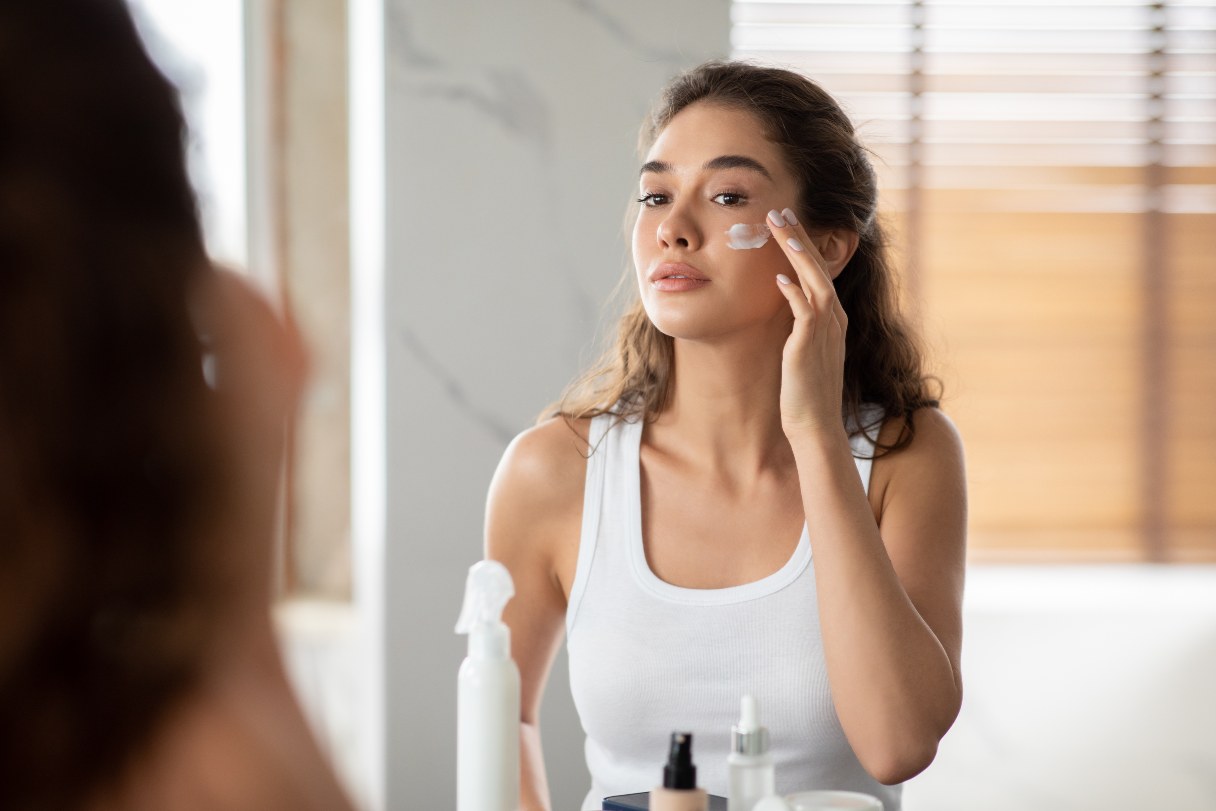If you’re looking for ways to give your skin a more youthful and healthy glow without invasive or drastic surgical procedures, consider naturally occurring substances known as peptides. Peptides are powerhouse ingredients in skin care, a natural way to treat the signs of aging while hydrating and repairing skin.1
Dermatology has already begun to incorporate these biological wonders into treatments for their powerful properties. Read on to find out why you might want to do the same.
What Are Peptides?
A peptide is a naturally occurring substance found in the body comprised of anywhere from three to 30 amino acids (though they can also be made synthetically). Peptides have multiple functions in skin health, ranging from antimicrobial to anti-inflammatory, and play a role in anti-aging and improving the skin barrier.1
How peptides function in the body
These short chains of amino acids act as messengers that signal skin cells to perform important functions such as boosting collagen production, enhancing elasticity and reducing inflammation, to name a few.1
Different types of peptides serve unique roles: Signal peptides stimulate collagen synthesis, carrier peptides deliver essential minerals for skin regeneration, neurotransmitter inhibitor peptides relax facial muscles to minimize wrinkles and enzyme inhibitor peptides help prevent collagen breakdown.1
Despite their benefits, peptides often struggle to penetrate the skin barrier, which requires additional support such as electroporation (small electrical pulses), microneedles or chemical penetration enhancers to improve delivery.1
Which Types of Peptides Promote Skin Health?
There are numerous peptides, but the following four key types are used in skin care for their combined ability to restore the traits of skin most people seek: smoothing out fine lines and wrinkles, enhancing elasticity and firmness and offering a more radiant appearance.1
| Type | Benefit |
|---|---|
| Carrier peptide | Delivers minerals like copper and manganese to support collagen production, healing, skin health and strengthening the skin barrier |
| Enzyme inhibitor peptide | Prevents collagen breakdown by blocking enzymes that can accelerate aging to help skin stay firm, elastic and smooth |
| Neurotransmitter inhibitor peptide | Relaxes facial muscles by blocking nerve signals, which can reduce expression lines and wrinkles and may help decrease wrinkle depth over time |
| Signal peptide | Stimulates collagen and elastin production to promote firmness and smoothness and aids in the repair and renewal of skin by mimicking natural processes |
Benefits of Peptides for Your Skin Health
Peptides are gaining popularity for their powerful anti-aging and protective properties. Here's a breakdown of the key ways peptides can enhance your skin health:2
Collagen stimulation
Peptides, particularly signal peptides, are great at signaling skin cells to boost the production of collagen, the critical protein that gives skin its elasticity and firmness. Signal peptides include palmitoyl tripeptide-1 and palmitoyl tripeptide-5.
Enhancing the skin barrier
Your skin barrier is an important line of defense against sun damage, environmental stressors and loss of hydration. Carrier peptides help strengthen this protective barrier by rallying essential minerals that enhance skin barrier function, helping your skin stay hydrated and resilient.
Anti-inflammatory benefits
Inflammation can accelerate aging and contribute to various skin issues, from acne to sensitivity. Certain peptides, like palmitoyl hexapeptide-12, reduce inflammation by limiting the production of pro-inflammatory molecules.
Wound healing properties
In addition to helping restore skin health and a youthful appearance, peptides can promote wound healing and skin regeneration. Copper peptides increase collagen and elastin production, accelerating tissue repair and reducing recovery time. By stimulating skin cell growth, skin can heal faster with potentially reduced scarring.
Benefits of Peptides for Anti-Aging
Though peptides have numerous benefits, their anti-aging properties are among the reasons they’re so useful. These include:2
Reducing the appearance of fine lines and wrinkles
Neurotransmitter inhibitor peptides are especially beneficial in reducing fine lines and wrinkles. Peptides such as acetyl hexapeptide-3 block the signals of proteins involved in muscle contractions, which relax facial muscles. This can create an appearance of smoother skin and diminished lines or wrinkles.
Improving skin firmness and elasticity
Signal peptides help skin look and feel firmer by stimulating collagen and elastin production. Peptides like palmitoyl tripeptide-5 support collagen production by increasing growth factors that you lose with age. This can help the skin look plumper and more youthful.
Encouraging brighter, more radiant skin
Carrier peptides enhance skin brightness by delivering essential trace minerals that are key to healthy skin function. Peptides such as copper peptides help protect against oxidative stress and sun damage, promoting overall brighter, more radiant skin.
Combating dryness and enhancing hydration
Peptides also have significant moisturizing and barrier-enhancing capabilities. They support the synthesis of collagen, elastin and moisture-enhancing glycosaminoglycans. Additionally, peptide technologies help improve the skin’s moisture retention capabilities, locking in moisture.1
Supporting skin microbiome health and integrity
Skin has a microbiome just like your gut, and antimicrobial peptides can help protect this microbiome, minimizing inflammatory skin conditions like acne.
Tips to Add Peptides to Your Skin Care Routine
If you’re eager to bring peptides into your skin care routine, there are a variety of products on the market that can help. However, you’ll want to put in some research to make sure you’re getting the best products and adopting the best routines for your skin and desired outcomes. Here are a few things to consider:
Know your skin care needs
Before you buy any peptide skin care products, first identify what issues you’re seeking to correct, such as wrinkles, skin dullness or sagging.3 It may help to speak with a skin care professional first. Some products may target a specific issue, while others might have an overall rejuvenating formula.
Identify products with effective peptide formulations
With multiple peptide-based products on the market, it’s important to be discerning when you shop. Some tips for finding the best products include:
- Clinical evidence. Products that mention research studies are likely to be more effective.
- Checking the ingredients. Peptides should appear toward the beginning of the ingredient list, rather than the end, to ensure you’re getting a good amount.4
- Multiple peptides. Products with multiple peptides are likely going to be more effective.4
- Standard peptides. Some of the better-known peptides to look for include: Argireline® (acetyl hexapeptide-3); Copper peptides; GHK-Cu (copper tripeptide-1); Matrixyl® (palmitoyl pentapeptide-4).1
Stay consistent
While peptides have been shown to improve skin, the key is to be consistent. Incorporate these products into your morning and evening skin care routines.5
For your morning routine, consider applying a peptide cleansing serum.5 Apply it before your moisturizer and SPF.4
For your evening routine, try adding a peptide serum after cleansing and before moisturizing to lock in the benefits overnight.5
Combine peptides with other anti-aging ingredients
Additionally, peptides may be even more effective when you combine them with other skin products with ingredients like hyaluronic acid, antioxidants and/or retinoids, though you may want to seek a skin care professional’s opinion first.3
Choosing the Right Peptides for You
You’ll want to shop for peptides with a few things in mind: your skin type, the results you’re seeking and the form of product you are most interested in.
You can start with a peptide-enhanced cleanser and toner to give your skin hydration and protection. Then, add in an anti-aging serum containing signal peptides to help boost collagen production and decrease the appearance of wrinkles. Finally, apply a carrier peptide-rich moisturizer to lessen dryness and lock in moisture.5
Additionally, consider the concentration of peptides, since this can affect how quickly the skin absorbs them.5 Some healthcare professionals may offer peptide-based skin care treatments in the office with medical-grade products you may not be able to purchase over the counter.6
Potential Side Effects and Considerations
While peptides are considered safe and well-tolerated by most skin types, there are some possible side effects and considerations, including:4
- Allergic reactions. While rare, these can happen. Consult a doctor if you suspect you’re having an allergic reaction.
- Incompatibility with other products. Not all products go well with peptides. Avoid strong alpha hydroxy acids (AHAs) or vitamin C products.
- Sensitive skin. If you have highly sensitive skin, you may still be able to use peptides but could have to build up a tolerance. You may need to start with lower concentrations and less frequent applications until your skin adjusts.
- Sensitivity to sunlight. Peptides themselves don’t cause sun sensitivity, but they may be in formulations that can, such as retinol. Make sure you’re using sunscreen.
- Skin irritation. Some people, particularly those with sensitive skin, can experience irritation, redness or itching. A patch test is recommended before using it all over your face.
It's always a good idea to consult with a dermatologist first before using peptide products if:
- You have skin conditions like dermatitis, eczema, psoriasis or rosacea
- You have had a recent facial cosmetic procedure or surgery
- You're pregnant or breastfeeding
- You're taking certain prescription medications that might interact with skin care ingredients
Peptides Can Help Enhance Your Skin Health
Peptides can offer a variety of restorative support to your skin care routine. Before you choose a product, however, narrow down your goals and consult with a skin care professional so you can opt for peptide products that are optimal for the health of your skin. With consistent use, peptides can enhance hydration and promote a more youthful, radiant complexion.
CareCredit Credit Card Financing for Dermatology
The CareCredit credit card makes it easy to pay for dermatology visits, over-the-counter treatments and prescription medications at locations within the CareCredit network.* Start enhancing your skin today and find a dermatologist near you that accepts CareCredit. Continue your wellness journey by downloading the CareCredit Mobile App to manage your account, find a provider on the go and easily access the Well U blog for more great articles, podcasts and videos.
In addition to dermatology, you can also use your CareCredit credit card for other cosmetic procedures, dentistry, pet care, vision, hearing, health systems, pharmacy purchases, spa treatments and so much more within the CareCredit network. How will you invest in your health and wellness next?
Author Bio
Jordan Rosenfeld has been freelance writing for 21 years about finances, health, education and more. Her work has appeared in The Atlantic, The Billfold, Good Magazine, GOBankingRates, Daily Worth, Quartz, Medical Economics, The New York Times, PayPal, The Washington Post and more.







